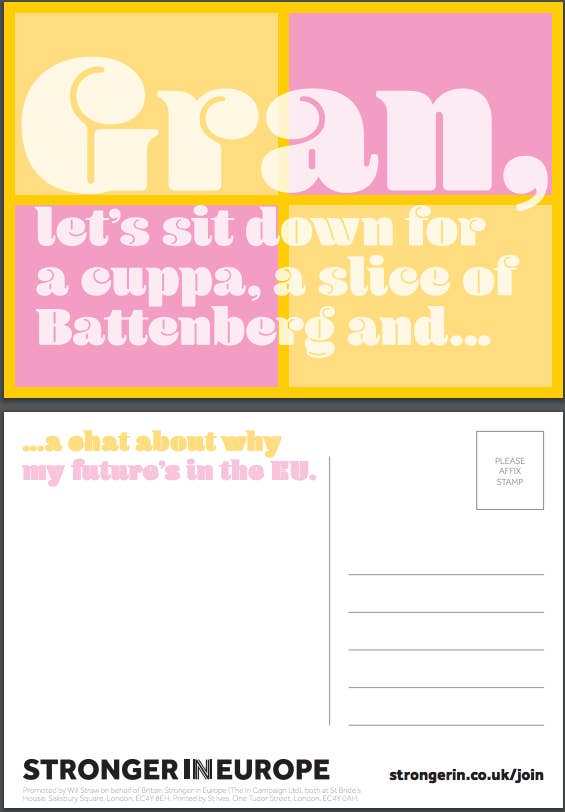
Young people are being urged to pick up the phone or send an e-card to their grandparents to persuade them to vote Remain in the upcoming EU referendum.
In a sign of growing panic that older Eurosceptics could swing the vote, the pro-EU camp launched a new "Talk to Gran" campaign on Wednesday aimed at winning over all generations.
But the new drive was promptly branded "patronising" by Leave campaigners, who pointed out that it was wrong to assume all young people want to stay in the EU.
The referendum on 23 June is the first opportunity in four decades for British voters to decide whether Britain should be a member of the European Union. Yet recent research suggests that young people are far less likely to bother voting than older people.

The new campaign from Britain Stronger in Europe (BSE) is asking its young supporters, especially students, to speak to their older relatives either face-to-face, over the phone, or via a postcard or e-card.
Fourteen different postcard designs are available, with different variations for Mum, Dad, Gran, Grandad, and Nan. One says: "Gran, let's sit down for a cuppa, a slice of Battenberg and... a chat about why my future's in the EU."
In an online video to accompany the campaign, students are encouraged to tell their relatives that "being in the EU gives you loads of opportunities because you're free to work, travel and study on the Erasmus programme anywhere in Europe". It adds: "Tell them it's better for your job prospects."
The campaign hasn't gone down well with everyone. This was the reaction from BeLeave, a group representing young people who want to leave the EU.
Not content with young people alone, @StrongerIn have launched their 'talk to gran' initiative, to patronise older generations too.
Tom Pursglove, co-founder of Leave campaign Grassroots Out and, at 27, the youngest Conservative MP, said: “The conventional orthodoxy that young people are all massive fans of the EU project is completely wrong. The EU is anti-democratic and has failed young people since its inception.
“Young people are internationalists. They do not want to be confined to EU borders. They want the chance to work and live in countries around the world. By leaving the EU, we can strengthen our ties with countries in all four corners of the globe."
Tom Harwood, chair of the Students for Britain group, added: "Not content with constantly talking down our economy, now it seems that BSE want to patronise voters of all ages with their desperate 'grab a granny' campaign."
The postcards will be sent to more than 50 pro-EU student groups, who will be encouraged to make sure reams of them are sent out to older relatives.
Will Straw, executive director of BSE, said: “We believe that the passion and enthusiasm of young voters can be channelled into getting their older relatives out to vote for Britain to remain in Europe.
"This referendum will not be won simply by winning the argument in the media, but by creating a bottom-up, word-of-mouth campaign that will reach voters of every age in all parts of our country."
View this video on YouTube
The "Talk to Gran" campaign video
The new campaign follows a call from pro-EU campaigner and education secretary Nicky Morgan last month for young people to make sure they cast their vote.
She warned that "otherwise they risk having the decision made by other people, their future decided for them, not by them". David Cameron has also warned that his fear is pro-EU voters staying at home.
A UKIP spokesman told BuzzFeed News that the campaign could well backfire because many older people would seek to persuade their younger relatives to vote to leave the EU.
"We're delighted by this campaign because grandparents have a far greater depth of knowledge and they will be able to talk to young people about the impact of mass migration on reducing wages and the problems of housing," he said.
"The more people know about the EU, the less likely they will vote to remain."

